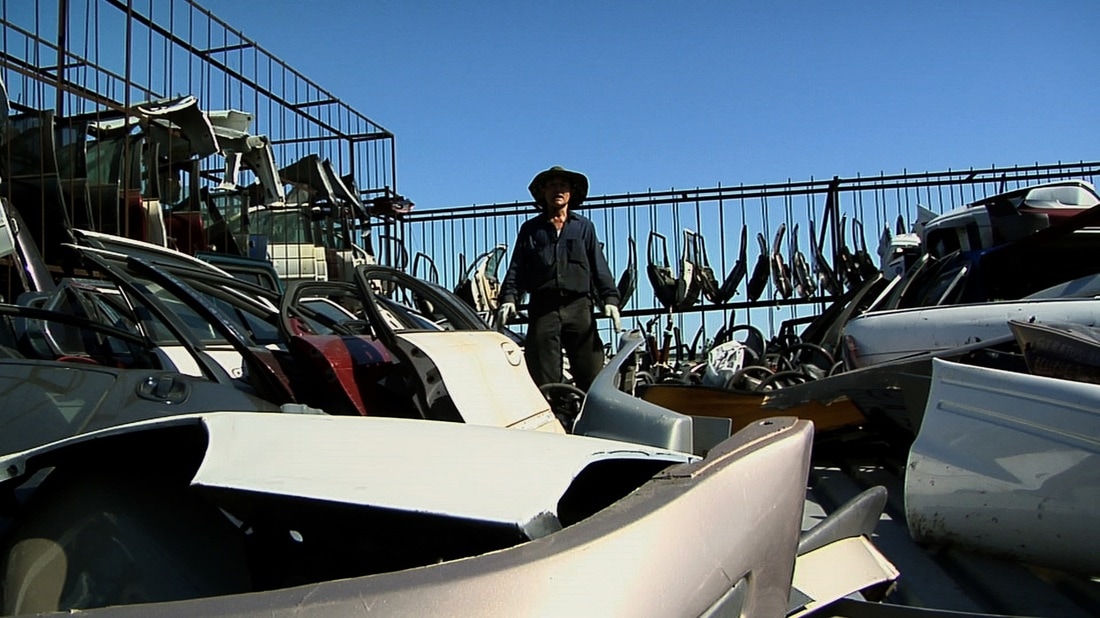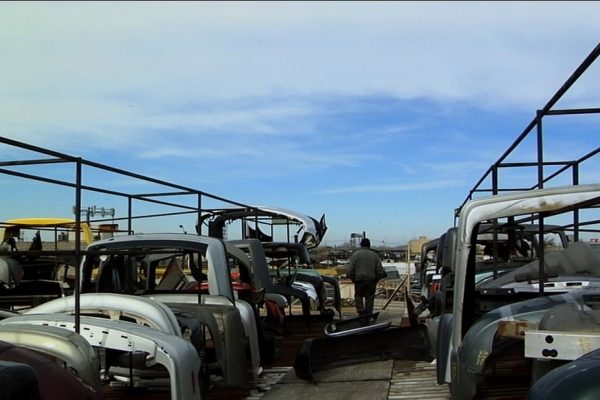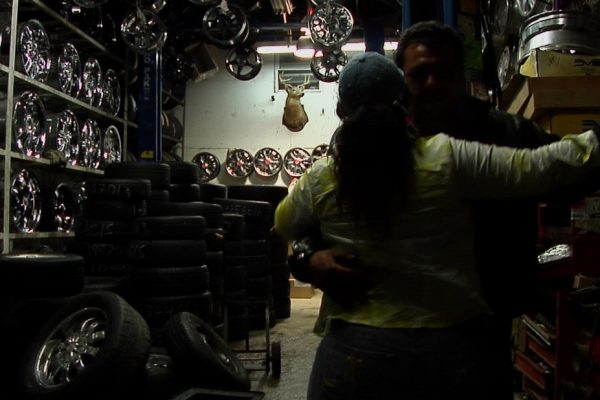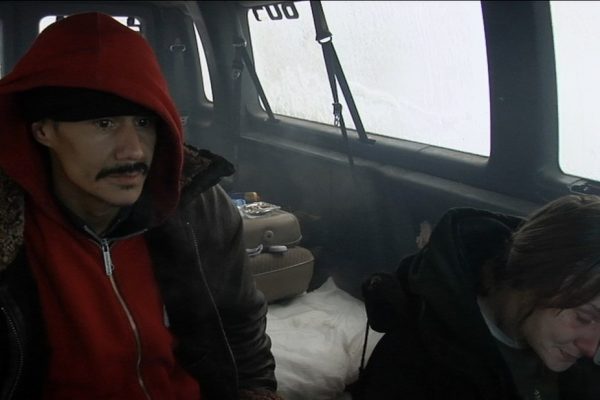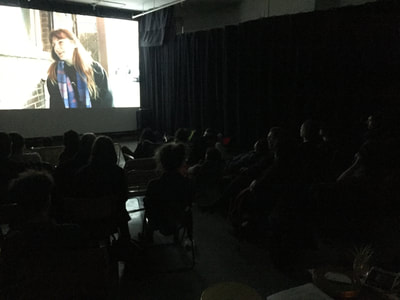Quand | When
04.03.2017 | 20h00
Où | Where
la lumière collective
7080, rue Alexandra, Montréal [QC]
Média | Media
projections HD
En présence de JP Sniadecki
Billets | Tickets
7$ à la porte
“In a more general way, Foreign Parts and its anthropological cinema is a key step in the movement away from a deleterious American brand of didactic nonfiction funded by the coffers of HBO, PBS, and the Sundance Institute.” – Robert Koehler
Enclavé dans l’ombre du nouveau Mets Stadium de baseball, le quartier de Willets Point dans le Queens, est une zone industrielle vouée à la démolition. Fait de dépôts de voitures et de revendeurs de pièces d’occasion, sans trottoir ni tout à l’égout, le quartier semble mûr pour une reconversion touristique. Mais Foreign Parts y découvre une étrange communauté où épaves, déchets et recyclage constituent un commerce florissant: les véhicules sont dépecés, triés et rangés par marque et par pièce, puis revendus à une longue file de clients en voiture.
VÉRÉNA PARAVEL
Véréma Paravel (née le 21 avril 1971 à Neuchâtel, en Suisse) est une anthropologue et artiste française qui œuvre dans le milieu du cinéma, de la vidéo et de la photographie. Paravel est née à Neuchâtel, Suisse, de parents français, et a grandi en Algérie, au Portugal, au Togo, en Côte-d’Ivoire, en URSS et en France. Elle a enseigné à l’Université de Toulouse et détient un doctorat en Anthropologie et Sciences des Communications de l’Université de Toulouse II. Elle a ensuite travaillé avec Bruno Latour à l’École Nationale Supérieure des Mines de Paris. En 2004, elle s’est relocalisée aux États-Unis, où elle a obtenu une bourse postdoctorale de l’Université Columbia.
Depuis 2006, Véréna Paravel travaille avec Lucien Castaing-Taylor au Sensory Ethnography Lab de l’Université Harvard. Elle a été maître de conférences au sein du département d’anthropologie de l’Université Harvard et, en 2012-2013, elle a reçu la bourse Frieda L. Miller en Film, Vidéo, Son et Nouveaux Médias du Film Study Center ainsi qu’une bourse du Radcliffe Institute for Advanced Study. Elle fait également partie de la faculté d’enseignement supérieur de l’École des Arts Politiques de Sciences Po, à Paris. En 2013, Castaing-Taylor et Paravel ont conjointement reçu le prix True Vision du festival True/False. Ses œuvres cinématographiques et vidéographiques ont été projetées à Berlin, Locarno, New York, Toronto, ainsi que dans de nombreux autres festivals. Sa filmographie inclut 7 Queens (2008), Interface Series (2008-2010), Foreign Parts (2010) et Leviathan (avec Castaing-Taylor, 2012).
Véréma Paravel (born 21 April 1971 in Neuchâtel, Switzerland) is a French anthropologist and artist who works in film, video, and photography. Paravel was born in Neuchâtel, Switzerland, to French parents, and grew up in Algeria, Portugal, Togo, Côte d’Ivoire, the Soviet Union, and France. She taught at the Université de Toulouse, and received her PhD in Anthropology and Communication Sciences from the Université de Toulouse II. She later worked with Bruno Latour at the École Nationale Supérieure des Mines de Paris. In 2004, she moved to the United States, where she had a postdoctoral fellowship at Columbia University.
Since 2006, Verena Paravel has worked with Lucien Castaing-Taylor at the Sensory Ethnography Lab at Harvard University. She has been a Lecturer in the Department of Anthropology at Harvard University, and in 2012-13 she was the Frieda L. Miller Fellow in Film, Video, Sound, and New Media at the Film Study Center and the Radcliffe Institute for Advanced Study. She is also on the master class faculty at the Ecole des Arts Politiques at Sciences Po in Paris. In 2013, she and Castaing-Taylor jointly received the True Vision Award from the True/False Film Festival. Her works in film and video have screened at Berlin, Locarno, New York, Toronto, and other film festivals. They include 7 Queens(2008), Interface Series (2008-10), Foreign Parts (2010), and Leviathan (with Castaing-Taylor, 2012).
JP SNIADECKI
J.P. Sniadecki, cinéaste et anthropologiste, réside aux États-Unis et en Chine. Il détient un doctorat en anthropologie sociale médiatique de Harvard. Ces films ont été présentés dans de nombreux festivals comme la Berlinale, Locarno, New York, AFI, Edinburgh, Rotterdam, San Francisco, la Viennale, Vancouver, BAFICI, RIDM, Cinéma du Réel, Riviera Maya, FICUNAM, et DoChina ainsi que dans divers lieux comme le MoMA et le Guggenheim à New York, le MAC à Viennes, UCCA à Beijing, la Biennale de Shanghai en 2014, et la Biennale Whitney aussi en 2014. Ses films : Chaiqan/Demolition(2010), gagnant du Prix Joris Ives; Foreign Parts (2010), gagnant de deux Leopards à Locarno et nommé Meilleur Film au Festival du Film Punto de Vista et au DocsBarcelona; People’s Park (2012), nommé Meilleur Film Anthrpologique au Festival dei Popoli; et Yumen (2013), nommé Meillur Film Expérimental et Meilleur Film Chinois au Festival International du Film Documentaire de Taïwan. Le dernier film de J.P. Sniadecki , The Iron Ministry (2014), choix de la critique par A.O. Scott du New York Times, a été présenté largement et a reçu les prix des jurys au Festival du film Ann Arbor ainsi qu’à Valdivia et au Festival du film international de Camden.
J.P Sniadecki is a filmmaker and anthropologist active in the United States and China. He holds a PhD in Social Anthropology with Media from Harvard and is currently teaching in the MFA in Documentary Media at Northwestern University. His films have screened at festivals such as the Berlinale, Locarno, New York, AFI, Edinburgh, Rotterdam, San Francisco, Viennale, Vancouver, BAFICI, RIDM, Cinema du Reel, Riviera Maya, FICUNAM, and DOChina as well as at venues such as New York’s MoMA and Guggenheim, Vienna’s MAC, Beijing’s UCCA, the 2014 Shanghai Biennale, and the 2014 Whitney Biennale. His films include Chaiqian/Demolition (2010), winner of the Joris Ivens Award; Foreign Parts (2010), winner of two Leopards at Locarno and named Best Film at the Punto de Vista Film Festival and DocsBarcelona; People’s Park (2012), named Best Anthropological Film at Festival dei Popoli; and Yumen (2013), named Best Experimental Film and Best Chinese Film at the Taiwan International Documentary Film Festival. Sniadecki’s latest feature, The Iron Ministry (2014), was A.O. Scott’s “Critics Pick” in the New York Times and has screened widely and garnered jury prizes at the Ann Arbor Film Festival and the Valdivia and Camden International Film Festivals.
FOREIGN PARTS
20h00 | 80 min
2010 | HD | 80 min | English
Enclavé dans l’ombre du nouveau Mets Stadium de baseball, le quartier de Willets Point dans le Queens, est une zone industrielle vouée à la démolition. Fait de dépôts de voitures et de revendeurs de pièces d’occasion, sans trottoir ni tout à l’égout, le quartier semble mûr pour une reconversion touristique. Mais Foreign Parts y découvre une étrange communauté où épaves, déchets et recyclage constituent un commerce florissant: les véhicules sont dépecés, triés et rangés par marque et par pièce, puis revendus à une longue file de clients en voiture. Joe, l’un des derniers habitants, enrage, ameutant la rue tel un roi Lear perdu pour tenter de s’opposer à leur expulsion imminente. Sara et Luis, un couple qui vit dans un van abandonné, se débattent pour se nourrir et rester à l’abri en plein hiver pendant que Julia, la reine de la fourrière sans domicile, s’exalte dans de béates visions de la vie quotidienne. Le film observe sur le vif la lutte des habitants contre ce « droit à l’expulsion » contesté, avant qu’ils ne soient avalés par la capitalisation de l’écologie urbaine de New York. – [Comité du film ethnographique]
A hidden enclave in the shadow of the New York Mets’ new stadium, the neighborhood of Willets Point is an industrial zone fated for demolition. Filled with scrapyards and auto salvage shops, lacking sidewalks or sewage lines, the area seems ripe for urban development. But Foreign Parts discovers a strange community where wrecks, refuse and recycling form a thriving commerce. Cars are stripped, sorted and cataloged by brand and part, then resold to an endless parade of drive-thru customers. Joe, the last original resident, rages and rallies through the street like a lost King Lear, trying to contest his imminent eviction. Two lovers, Sara and Luis, struggle for food and safety through the winter while living in an abandoned van. Julia, the homeless queen of the junkyard, exalts in her beatific visions of daily life among the forgotten. The film observes and captures the struggle of a contested “eminent domain” neighborhood before its disappearance under the capitalization of New York’s urban ecology.
Translation © Nour Ouayda
Revisions : Emma Roufs


